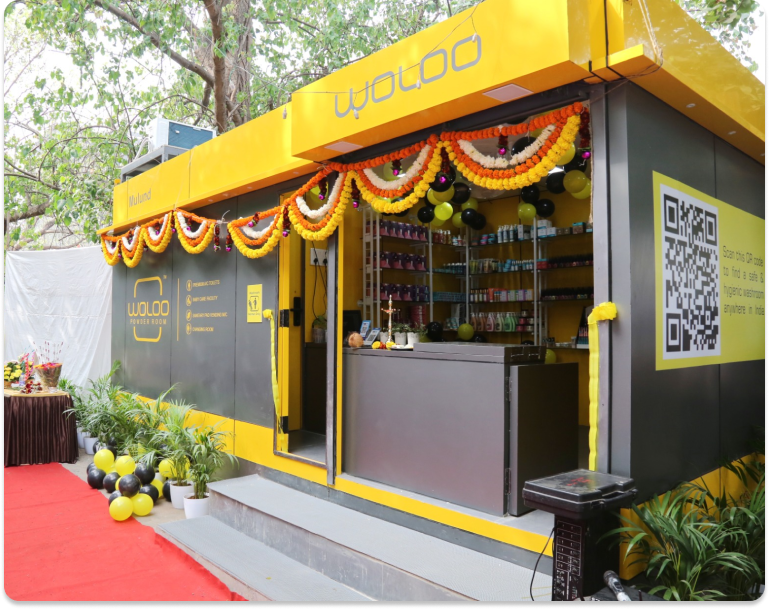What Is Woloo and Why Does It Matter?
Woloo (short for “Women’s Loo”) is a tech-enabled sanitation startup that provides women in India access to clean, safe, and hygienic public restrooms. The app connects users to certified washrooms in nearby restaurants, cafes, and commercial spaces — creating a digital ecosystem of verified hygiene partners.

The absence of clean toilets leads to serious consequences, including:
- Reduced mobility—many women avoid stepping out or drinking water.
- Insecurity and harassment near poorly managed public restrooms.
Woloo is trying to change that.
How Woloo Works: The Model Explained
Woloo is built around a simple yet powerful model:
App-Based Access
Users download the Woloo app (available on Android) and locate the nearest certified washroom based on their GPS.
Hygiene-Certified Partners
Each listed washroom is verified and certified using standards laid out by the Toilet Board Coalition’s “Toilet Hygiene Code”, ensuring cleanliness, availability of water, security, and sanitary supplies.
Subscription & Walk-In Plans
Woloo offers a monthly or annual subscription for regular users, along with one-time access options for occasional users. Subscriptions come with additional features like restroom ratings, reviews, and priority support.
IoT and Monitoring
Some restrooms are equipped with smart sensors and real-time feedback tools, enabling Woloo to track hygiene metrics and user satisfaction levels.
The Woloo Ecosystem: Beyond Just Toilets
What makes Woloo unique is that it’s not just offering public toilets — it’s building a women-centric sanitation ecosystem. Here’s how:
- Woloo Lounges: These are dedicated sanitary hubs for women, offering toilets, sanitary pad vending machines, baby feeding areas, and changing rooms.
- Woloo Franchise Model: Entrepreneurs and organizations can set up certified Woloo restrooms, helping scale the network across cities.
- Corporate Tie-Ups: Woloo is working with municipal bodies, mall chains, and co-working spaces to onboard them as hygiene partners.
The vision? Make access to dignified sanitation a right, not a privilege.
The Founders’ Vision:
- Address India’s public sanitation crisis for women using a tech-first solution.
- Certify thousands of restrooms and build a pan-India network.
- Normalize talking about women’s hygiene in public and professional spaces.
The Ask:
The founders asked for investment to expand operations, improve tech infrastructure, and spread awareness.
Shark Reactions:
- Some sharks questioned the scalability and monetization.
- Others praised the vision, relevance, and social commitment.
The Problem Woloo Solves: A Closer Look
Let’s break down the core problems Woloo is addressing:
Problem #1: Lack of Safe Public Toilets
India’s public toilets are often dirty, unsafe, and lack basic amenities like water and lighting.
Woloo’s Solution:
Tie up with private businesses (cafes, restaurants) to offer certified and maintained restrooms.
Problem #2: Gender Inequality in Sanitation
Most public toilet infrastructure is male-focused, leaving women with fewer clean and safe options.
Woloo’s Solution:
A women-first platform that addresses unique hygiene needs — with added safety features like user ratings, verified locations, and well-lit areas.
Woloo’s Solution:
Crowdsource existing facilities and turn them into usable public infrastructure — a scalable and sustainable alternative to building new restrooms.
Woloo’s Current Reach and Future Plans
Currently Active In:
- Mumbai
- Pune
- Jaipur
- Delhi (pilot)
App Metrics:
- 50,000+ app downloads
- 3,500+ certified washrooms
- User retention rate of 70% in top cities
Expansion Roadmap:
- Targeting Tier 2 and Tier 3 cities
- Rolling out Woloo Lounges in metro stations, malls, and transport hubs
- Partnering with state governments and NGOs for public sanitation initiatives
How Woloo is Aligned with National Goals
Woloo isn’t just a startup — it’s supporting national sanitation missions, including:
- Swachh Bharat Abhiyan (Clean India Mission)
- Smart Cities Mission (urban hygiene and digitization)
- Beti Bachao, Beti Padhao (by ensuring safe sanitation in schools and public areas)
Challenges and Criticism
- Consistency of hygiene across all partners
- Affordability for low-income users if subscriptions are priced too high
- Behavioral change — women trusting a new sanitation app and adapting usage patterns
- Infrastructure maintenance — ensuring toilets remain clean after onboarding
The team is actively working on user education, partnerships with CSR initiatives, and community feedback to overcome these hurdles.
Frequently Asked Questions (FAQs)
❓Is Woloo free?
Basic usage of the app is free.
❓How does Woloo ensure hygiene?
Woloo follows the Toilet Hygiene Code from the Toilet Board Coalition. Regular checks, user feedback, and partner training ensure compliance.
❓Where can I use Woloo?
Currently in Mumbai, Pune, Jaipur, and select parts of Delhi. Expansion is underway.
❓Can men use Woloo?
The primary focus remains women’s sanitation.
❓Can I list my restroom with Woloo?
Yes! Businesses can apply to become Woloo Hygiene Partners via their website.
Final Thoughts: Will Woloo Redefine Public Sanitation in India?
With smart tech, hygiene partnerships, and a women-first mindset, they’ve already begun changing how public sanitation is perceived — and experienced.
For more Blogs: beyondthepunchlines

 Add to favorites
Add to favorites





